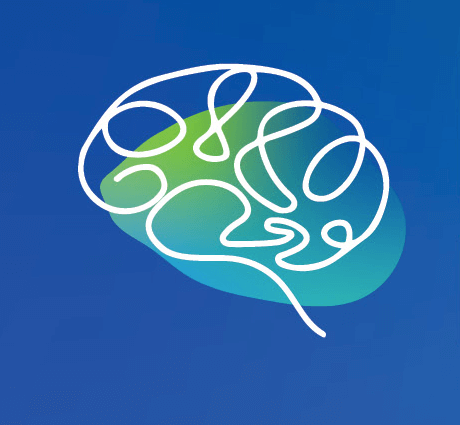
Mindleader Message in Tiara’s Hat Parade
What Tiara’s Hat Parade Teaches Us About Emotional Resilience...
Learn MoreOrlando Family Stage
The Finest in Family Theater
Meet Stacie Perez, Director of Arts-Based Learning, and discover how Orlando Family Stage approaches Arts Education for teacher and student success! Check out our Professional Development and Arts-Based Residencies and book one for your school today!
Tell us about yourself and your background in Arts Education?
I have been with Orlando Family Stage (OFS) for over 18 years now! This organization has been such a big part of my life, as well as a continuation of a creative constant in my journey that started when I was a very young child. Throughout my school-aged years I explored and practiced every area within the arts, and can absolutely attest to the fact that it has helped me overcome so many different obstacles and challenges I’ve had to navigate. My concentration was in vocal performance; singing has always been an important outlet and practice for me. During my undergraduate studies, I started to explore the possibilities of teaching as a profession, in fact, I changed my major thinking that I would be in the classroom full-time. Aside from the arts, I also had a passion for helping children learn English. Being that I was the first generation born to immigrant parents here in the U.S. and the very first in my family to speak and study English from birth, I felt a responsibility to give back. Little did I know my journey landed me in this incredible organization that would allow me to work in the intersections of these very important areas – the arts and education. As the Director of Arts-Based Learning, I have been able to do really incredible work with so many students, teachers, administrators, artists, community partners, arts organizations, and even manage Orlando Family Stage’s very first research study focusing on the role of arts-integration in dual language classrooms in Orange County Public Schools (OCPS) – an absolute dream come true for me! I feel so fortunate to work here and do work that I really love!
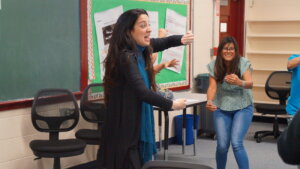
What is Arts-Based programming at Orlando Family Stage?
Arts-based learning programming truly focuses on the intersection of the arts and education. I would say the ultimate goal is figuring out how to integrate the arts in all areas within the realm of education! This is done in a variety of different ways, including working directly with students, teachers, administrators, and community partners. A big part of my job is to connect and identify needs within the schools and community where the arts can serve as a tool to support learning and growth. This can look like professional development workshops for teachers, residencies in the classrooms for students, mentoring undergraduate and graduate students striving to become arts educators, supporting research projects in this area, working alongside other organizations and community partners focused on the same mission, and ultimately, sharing our information and bringing awareness about the incredible work that our organization does! What I love about arts-based programming is that the possibilities are truly endless; I love the level of intentionality and creativity that happens when we integrate the arts into all these different areas and subjects!
What is arts integration?
Arts integration is an approach to teaching where both an art and curricular objective are woven together to create a learning experience that is meaningful and holistic. Students not only learn new material, but do so in a way that enhances motivation, creativity, and personal reflection. I love this approach because it puts the arts at the same level as the rest of the curriculum; so it opens up so many possibilities for students to become active participants in their own learning instead of passive receivers of information.
Why do you feel arts education programs are important?
Growing up in the arts since I was a very young child shaped so much of how I process and view the world around me – I couldn’t imagine not having had those opportunities growing up. Being able to not only use the arts as a creative outlet, but also as a tool for learning motivated me and helped me build so much confidence in so many different areas of my life. I believe that arts education gives students another option and pathway to explore and make connections that they might not otherwise – I’ve always viewed the arts as a bridge that connects the subjective to the objective. If you think about it, every single skill that a young person learns through arts education can be connected and applied to other areas in their lives – it’s not about shaping artists, it’s about shaping well-rounded citizens of the world.
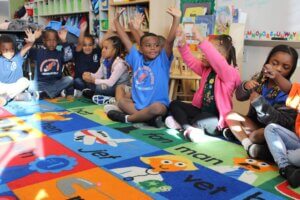
What can teachers expect during an arts integration professional development session with Orlando Family Stage?
OFS really prides itself in having a robust pool of working professionals and teaching artists specialized in various branches within the arts. A lot of care and detailed planning goes into every professional development (PD) session we offer; we work very hard at making sure every aspect of our PD workshops provide clear and attainable materials that any teacher, regardless of the subject they teach, can confidently take and easily implement into their own practice.
Tell us about one of the newest professional development experiences that you have created.
In more recent years, I would say the biggest goal for me was to not just create one-off PD workshops, but full day professional learning experiences that are impactful and inspiring. We make sure to frame each experience around state standards and provide various hands-on learning activities and opportunities. This means that when a teacher comes to an arts integrated PD experience, they first see one of our live productions to get a sense of how we produce work for young audiences. They then see a live model lesson led for a group of students by a professional teaching artist that focuses on teaching both a curricular and art goal that is tied to a theme from the show. Teachers are given time to reflect on what they observed during the model lesson and then are provided with a 3-hour PD session where they are taught and coached on how to approach that same framework for their own classrooms. We make sure they leave this experience with lots of great materials and resources too! This interactive and full day model has really proven to be both inspiring and invigorating for participants – there is opportunity for them to step away from their classrooms and look at their craft in different and innovative ways!
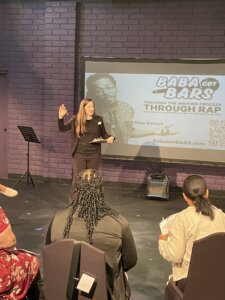
Why should administrators prioritize arts integration professional development for their teachers?
When administrators prioritize arts integration professional development for their teachers, they are prioritizing the well-being of their whole school culture and environment. The demands and pressures of being a teacher today don’t always lend themselves to cultivating spaces where teachers can freely explore and tune into their pedagogy. For many, the passion and art of teaching has gotten lost and is resulting in more and more teachers leaving the field. That is why supporting teachers to take time to participate in arts integration PD is so important – reigniting their love for teaching will only trickle down and reignite the love for learning in students. Arts integration is an approach that encourages creativity and joy, so when administrators support these types of learning opportunities, they are supporting the well-being of their teachers, as well as their students.
What do students and teachers gain from classroom residencies?
Both students and teachers greatly benefit from our residencies. For students, there is an opportunity to explore material and learn in a way that they may not have done before. Our teaching artists approach each experience with an artistic background and philosophy that makes their lens and techniques quite different than that of a school teacher. This typically results in really engaging and motivating lessons that spark curiosity and allow for creative expression – something that we are seeing less of in our school systems. For teachers, it is an opportunity to see an arts professional approach curriculum in a way that is enjoyable for both themselves and their students. Through this process teachers often learn many unique arts-based strategies and tools that they can easily implement into other areas and subjects in their classes.
What are some of your favorite memories from our Arts-Based Learning residencies?
This is such a difficult question to answer because there have been so many incredible experiences and memories I have made throughout the years both as an educator and manager of our arts-based learning residencies. Through these programs I have seen young children develop and acquire new language skills, others struggling to socialize become more engaged, and many underserved and marginalized by society develop into bold and confident leaders. I think the big one that comes to mind for me was when I started working with a teacher on a regular basis who was very hesitant to integrate the arts into her dual language class, in fact, she totally rejected it at first. I remember not wanting to give up and trying to figure out what her biggest trigger was, and realizing it was that she felt very uncomfortable reading because she was not a native English speaker – this caused enormous anxiety for her. As the months progressed, we worked on ways to explore stories, both in English and Spanish, and practiced very often to help build up her confidence. At the end of the school year, she developed into an incredible storyteller that truly immersed her students in story drama. Before leaving for summer break she shared with me that this process completely changed her attitude and view of teaching; she fell in love with her profession again and felt so much more confident reading out loud. Integrating the arts truly changed her pedagogy and how she approached her lessons – it was one of the most incredible transformations I had ever witnessed in the classroom!
As a member of the Kennedy Center’s Partners in Education Advisory Committee, can you tell us why this partnership is important and why you wanted to serve on the committee?
First of all, Orlando Family Stage is Florida’s only full time professional theatre for children and young audiences (TYA)! This is so important to understand because although it puts us on the map as the TYA leader in Florida, it also means that there aren’t always as many resources or other TYA organizations in the field within close physical proximity to us that share this same exact type of work, mission, or even challenges that we do. One of the reasons that I really wanted to join this committee was to connect with others around the nation who are part of the Partners in Education program and are doing similar work and focused on the same mission – we represent one of 85 different partnerships in the country! Our unique partnership with the Kennedy Center allows us to bring teaching artists from all over the country to work exclusively with OCPS teachers in the area of arts integration. The Kennedy Center is the nation’s leader in this work, so they serve as both a central hub and resource for all of us!
Can you share anything about the national conversation around Arts-Based Learning and its focus or benefits?
The national conversation around arts-based learning has always been about its potential to transform the education system and minds of our young people. Now more than ever, the need for the arts is growing. With so much happening and changing in our world, providing access to the arts is truly a necessity and something we should all be fighting for. So much research shows the impact it has on creating more inclusive, engaging, and creative learning spaces for students. I think that finding ways to not only share and celebrate the artistic components, but communicate exactly how the arts benefit this younger generation has become an important priority for arts groups and organizations.
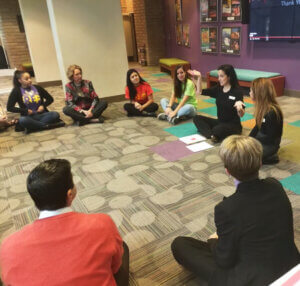
What are some of the challenges and hurdles that arts education programs are facing?
I think that one of the biggest hurdles that arts education constantly faces is that it is not prioritized as an “essential” part of the system. This misunderstanding often leads to it being vulnerable to budget cuts, lack of resources, teacher shortages, and an overall devaluation of its impact and importance in our communities. When it is labeled as a “perk” or “luxury”, it ends up creating social barriers that make it feel unattainable or unrealistic. These beliefs make it a constant challenge for arts advocates both on the local and national level.
What would you tell those wanting to support Arts in Education?
There are so many ways to help support Arts in Education! You can advocate for arts funding at school board meetings or at PTA events, volunteer at arts events in schools or art clubs, donate or help organize fundraisers for school programs, promote arts achievements in your community, or seek collaborative projects that support arts teachers in their schools!
Can you share three words to describe arts based learning?
Meaningful. Impactful. Joyful.
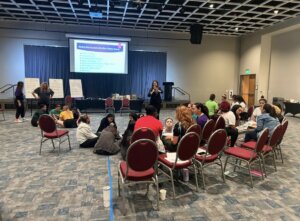
What are some of your hopes for the future of Arts-Based Learning at Orlando Family Stage?
Over the years I feel like Orlando Family Stage has really taken the position and lead as the hub for arts-based learning programming in Central Florida. I am so proud of how this programming has developed in recent years, and I would love to see it continue to flourish into so much more. I am constantly thinking of ideas and collaborating with teachers and colleagues that inspire me with their craft and incredible perspectives – I really love finding those unique intersections between art and education. My hope is to one day have a team working in this department that can help research, design, and create even more innovative work in the arts-based learning realm! I feel like we are just getting started!
Don't miss out on the magic. Grab your tickets now and
make unforgettable memories at Orlando Family Stage!